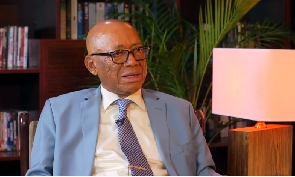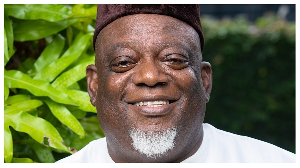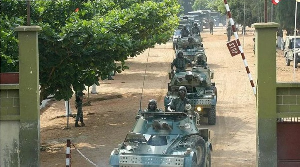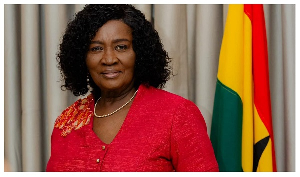The Eminent Advisory Committee of the Electoral Commission has called for calm among the political parties in connection with agitations over plans by the election management body to compile a new register ahead of the December 2020 polls.
A statement signed by the Chairman of the Committee, Justice Emile Short, said: “The Electoral Commission on Wednesday, 15 January 2020 held a meeting with members of the Eminent Advisory Committee to outline the justification for the procurement of a new biometric voter management system and the compilation of a new voter register for the 2020 general elections.
“At the end of the meeting, it was agreed that the EC and the Eminent Advisory Committee will meet with members of the Inter-Party Advisory Committee (IPAC) to have further deliberations on the matter.
“Meanwhile, the Eminent Advisory Committee calls for calm from all political parties and other stakeholders as they work in the national interest”, the statement said.
Meanwhile, President Nana Akufo-Addo, on Tuesday, said the Electoral Commission of Ghana has the constitutional mandate to compile a new and improved register of voters as part of its election management duties.
While some political parties, including the governing New Patriotic Party, are for the EC’s plans to compile a new register ahead of the December 2020 polls, others, including the biggest opposition party, the National Democratic Congress, are against it.
The opposers recently held a demonstration in Tamale, the capital of the Northern Region, to drum home their resistance to the compilation of a new register.
Making a passing comment on the demonstration vis-à-vis the EC’s mandate on Tuesday, 14 January 2020 when he delivered the opening address at the 71st New Year School at the Great Hall of the University of Ghana, Legon, on the theme: “Attaining Ghana Beyond Aid: Challenges and Prospects”, President Nana Addo Dankwa Akufo-Addo said the Tamale demonstration by the opposing side came off without any incident, a clear departure from what he deems the unfortunate past where similar demonstrations by opposition parties under the then-Mahama government, were, according to him, met with violence.
According to President Akufo-Addo, “Five years ago, we had demonstrations in Accra calling for a new, credible register, in which some citizens were maimed and brutalised. Indeed, a citizen, young Justice Adzakuma, lost his eye, and died last year. May God bless his soul.”
He continued, “Today, we are having peaceful demonstrations in Tamale; this time, protesting against the decision of the Electoral Commission, whose constitutional remit it is to compile an electoral register, to have now a new, improved register. Fortunately, in this new era, there are no casualties. God bless Ghana.”
EC’s reasons for a new register
At a press conference on Tuesday, 31 December 2019 to make a case for a new Biometric Voter Management System as well as a new voter roll, the EC’s Deputy Chairman in-charge of Operations, Mr Samuel Tettey, debunked assertions that the register of voters, in the past, “were used for ten years before they were replaced”.
“This assertion is not true”, he asserted.
He explained that: “Since 1987/88, the EC has replaced the voters register three times: 1995, 2004 and 2012. The 1987/88 voters register was used for 7 years, that of 1992 was used for 9 years, the 2004 register was replaced after 8 years and the 2012 register has been used for 8 years. It has been the practice over the years to replace the voters register after every 8 years: that is after two General Elections and two District Level Elections”.
According to him, “The reason for the periodic replacement of the voters’ register is mainly due to reforms to improve the credibility and integrity of the register hence our intention to add facial recognition to completely eliminate manual verification all together, thereby ensuring credibility and integrity of the elections”.
“Another reason for the difficulty of removing the names of the deceased from it, thus, rendering the register highly bloated after being used for 8 years. In effect, using such a register for subsequent election(s) will greatly affect the credibility of the election(s)”, Mr Tettey noted.
He also debunked assertions that state resources would be wasted in the process. “It has been alleged that the EC is wasting public resources to compile new voters register. This accusation is also far from the truth”, he said, recalling: “In 2012, the new voters register cost the Commission GHS 169,730,146.00. The 2014/2015 Limited Registration Exercise cost GHS 287,559.379. In 2016, the Limited Registration Exercise cost GHS 487,998,714.00; it is important to note that the compilation of a new voters register in 2020 is estimated to cost GHS 390,265,186.44. Note that we are referring to a new register here. The expenses stated above relate to cost of hiring registration officials and procurement of consumable registration materials. It’s worth mentioning that the current administration of the Commission is committed to judicious use of state resources for electoral activities”.
The EC also explained why it used the register for the recent district assembly elections, despite its qualms with its integrity.
“It has also been argued that if the current voters register is not in good shape, why was it used for the 2018 referendum and the just-ended DLE. The Commission's response is as follows;
“It is a well-known fact that the register is bloated and there has not been an effective means of cleaning it. We are discussing effective ways of doing this going forward. Besides, the current register does not include facial recognition feature as a means of verification. This has resulted in a high incidence of manual verification where the voter’s fingerprints cannot be verified. A recent case in point is the just-ended DLE. Out of 5,431,902 voters in the recent DLE, 34,843 were verified manually. This is a worrying trend which should not be encouraged. To give you a breakdown, out of the 205,735 persons who voted in the Upper West Region at the 2019 DLE, 8,728 were manually verified.
“The situation is not different in the Upper East Region where out of 271,961 voters 7,991 were manually verified.
“Assuming the turn out of the DLE was as high as 12 million as in the case of the 2016 General Elections, over 72, 000 voters would have been manually verified. This figure is significant in determining the outcome of an election.
“It would be recalled that in 2008, less than 40, 000 votes determined the outcome of election”.
The EC believes the integrity of the 2020 polls could be undermined if a new roll and a new Biometric Voter Management System are not put in place.
“The current kits and solutions are obsolete: They are End-Of-Life (EOL) and can no longer be supported by their Original Equipment Manufacturers (OEM). The immediate past vendors of the solution proposed that the Commission replace all the equipment and also upgrade the Data Centre. This was rehashed by the Consultants we engaged to audit our systems
“It is important to emphasise that whether we compile a new voters’ register or not, there is the need to acquire new equipment to replace the obsolete kits acquired in 2011. It is therefore important to delink the procurement of equipment and kits from the registration exercise. We state again that whether or not the EC compiles a new register or conducts a limited registration exercise, we will procure new kits to replace the obsolete ones. Additionally, we will acquire a new data centre with robust state-of-the-art servicers and equipment at the cost of 6 Million Dollars instead of upgrading the existing one at the cost of 15 million United States Dollars as proposed by the previous vendors.
“Again, we are replacing the existing software with a new one to enable us own and control our systems unlike the previous situation where the solution was owned, controlled and managed by the vendors.
“There is no doubt that the voters register is bloated. The bloat is because we have not developed an effective way of cleaning the register. The bloated register increases the cost of our elections. The Commission always procures election materials based on the number of registered voters. This causes a lot of waste as the number of registered voters exceeds the actual voters.
“Considering the above challenges, the Commission has come to the conclusion that it will be cheaper and prudent to acquire new BVRs and BVDs which are robust and user friendly than to upgrade old and obsolete ones. Again, the Commission will go ahead with the preparation of a new biometric voters’ register based on the reasons provided earlier”.
Inter-party opposition
One of the leading opposers to the register is the Managing Editor of the Daily Insight newspaper, Mr Kwesi Pratt Jr., who described as “useless", the decision by the EC to compile a new voter register 10 months to the December elections when he spoke at a forum organised by the parties that are against the new register.
Mr Pratt claims the electoral body is in a confused state, adding that the EC will throw the country into chaos if the decision to compile a new voter roll is not shelved.
Mr Pratt indicated that the appointees of President Nana Addo Dankwa Akufo-Addo who, are in charge of the electoral body, are answerable to Ghanaians and cannot go against the will of the people, threatening that they would be removed.
Addressing the forum in Accra on Thursday, 9 January 2020, Mr Pratt said: “I want to submit here and now that 10 months is not a sufficient period for compiling a new voter register, and if you attempt to do it, it will throw the next elections into total chaos. From the point of view of common sense, we should shelve this useless adventure of compiling a new voter register. They say the EC is an independent body, what does that mean? nothing is more nonsensical than that claim… The EC has partial independence and not absolute independence.
“Of course, if you know the people who are doing these things, sometimes no sense can sound like sense. These are the same people who go to fake prophets and fake bishops who are telling them that magic is the act of the possible, who are telling us that the act of impossible is possible, so, they are confused, they are totally confused”, he stated.
General News of Thursday, 16 January 2020
Source: classfmonline.com

















